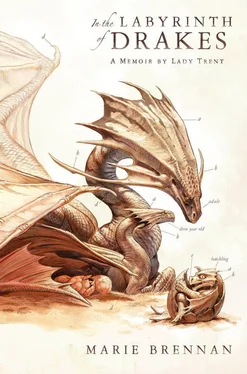Marie Brennan
IN THE LABYRINTH OF DRAKES
A MEMOIR BY LADY TRENT

I suspect a percentage of my readership will see the title of this volume and expect the entirety of what is contained herein to be devoted to a certain discovery that took place in the Labyrinth of Drakes. I will indeed discuss it in due course—have no fear on that count—but if that discovery is your sole concern, then you should close these covers forthwith and obtain for yourself a copy of Naomi Songfield’s excellent study Under the Watchers’ Eyes. That book will give you what you desire, in all the meticulous detail you could possibly hope for (and a good deal more besides).
The remainder of you, I presume, are here for the rest of it, the incidents and issues that surrounded me during the lead-up to and the aftermath of that discovery. This was an extraordinarily complex period in my life, and the tale is not a simple one to tell. In the space of a single year I grappled with dilemmas ethical, intellectual, and political; risked my life both voluntarily and otherwise; faced some of the worst condescension of my career and attained some of my greatest achievements; and made a decision that changed my course profoundly.
It is, in the end, an exceedingly personal tale. (An odd statement to make of a period that eventually drew such tremendous public scrutiny, I know.) Even I, shameless as I am, have hesitated on numerous occasions in the writing of it, for I cannot discuss many of these elements without sharing in detail the inner workings of my heart and mind. This is of course the purpose of a memoir, and I knew that when I embarked upon my task; but now that the time has come to speak of such matters, I confess my qualms. Whatever acclaim my professional deeds have garnered, I harbour no illusions that my personal thoughts and actions will do the same.
Be that as it may: this is my story, and I will tell it as I see fit. I will therefore follow the winding path that led me to the Labyrinth of Drakes—a path filled with every sort of obstacle, from scientific conundrums to assassination attempts—and invite you, gentle reader, to follow it with me.
Isabella, Lady Trent Falchester 26 Ventis, 5661
In which the memoirist acquires a job despite the opposition of multiple parties
An offer of employment—Breeding dragons—Lord Rossmere’s requirement—Looking for an old friend—My study—Preparations for departure—Reflections on the past
There is very little pleasure in being snubbed over a task for which one is well qualified. There is, however, quite a bit of pleasure in watching the ones who did the snubbing later eat their own words.
Credit for this pleasure must go to Thomas Wilker, who had for many years been my colleague in matters scientific. He was a Fellow of the Philosophers’ Colloquium, as I was not—that august body having condescended to admit into their ranks the occasional man of less than gentle birth, but no ladies regardless of their ancestry. Strictly speaking, it was Tom and not I who received the snubbing.
The post refused to him was the focus of stiff competition. Natural history as a scholarly field was not so terribly old; the more specialized topic of dragon naturalism had only recently begun to emerge as an area of study in its own right. Tom’s publications and my own played a part in that trend, but we were not the only ones: there were easily half a dozen people in Anthiope with similar interests, the esteemed Herr Doktor Stanislau von Lösberg not least among them.
Those half-dozen lived abroad, though, in places such as Eiverheim and Thiessin. In Scirland there was no one whose qualifications truly challenged Tom’s, now that he was a Colloquium Fellow. When a position opened up that called specifically for a dragon naturalist, he should have been the first choice—as indeed he was.
Any rumour which says he refused the position is false. Tom did not refuse. On the contrary, he told his prospective employers that he and I would be delighted to accept. When they said the offer was for him alone, he assured them I would not need a salary, as my recent speaking tours and publications had left me with quite a comfortable income. (As it happens I would have appreciated the salary, for my income did not go so far as it might—but I would have foregone that for such an opportunity.) They made it clear that regardless of finances, I was not welcome in this endeavour. Tom maintained that to hire him was to hire us both; they hired Arthur Halstaff, Baron Tavenor in our stead; and that was the end of that.
For a time.
A year and a half later, the employers in question came crawling back. Lord Tavenor had resigned his position; he had met with no success thus far, and had difficulty with the locals besides. The offer to Tom was renewed. So in turn was his condition—only this time he said that, upon reflection, a salary for me might be just the thing after all. He made it quite clear that if they did not see fit to meet his conditions, then they could go hang.
This is, in brief, how I came to be employed by the Royal Scirling Army in the deserts of Akhia, to raise for them their very own flight of dragons.
* * *
The problem of dragon-breeding was not a new one. Ever since prehistoric times, mankind has dreamt of harnessing dragons for his own ends. This has taken every form imaginable, from leaping atop the back of a fully grown dragon in the hope of breaking it to saddle—an attempt which almost invariably ends with a broken rider instead—to stealing hatchlings or eggs on the theory that a young creature is easier to tame, to caging dragons and optimistically encouraging them to breed.
That last is difficult to do even with less hazardous wild animals. Cheetahs, for example, are notoriously selective about their mating habits, and will go very rapidly from disinterest to ardour to mauling their erstwhile paramours. Others refuse the task entirely: whether it is for reasons of embarrassment or some other cause, the giant pandas of Yelang have never been known to reproduce within the confines of an imperial menagerie.
(I suppose I should offer fair warning. Because this volume of my memoirs concerns itself with my research in Akhia, it will of necessity say more than a little about the mating habits of dragons and other creatures. Those whose sensibilities are too delicate to endure such frankness might well be advised to have a more stout-hearted friend read them a carefully expurgated version. Though I fear that edition might be rather short.)
Dragons are even less tractable in this regard. The Yelangese in particular have a long history of trying to breed their dragons, but despite some rather grandiose historical claims, there is no reliable evidence of success with anything other than the smallest kinds. Large dragons, the sort that come to mind when one hears the word, simply will not cooperate.
And yet it was the cooperation of large dragons that we needed most, in the third decade of this century.
The reason, of course, was their bones. Astonishingly light and phenomenally strong, dragonbone is a wondrous substance… when one can get it. The bones decay rapidly after death, once their peculiar chemical composition is no longer protected by flesh and blood. A Chiavoran named Gaetano Rossi had developed a method for preserving them; Tom Wilker and I had stolen that method; it was stolen from us in turn, and sold to a company in Va Hing. Three years before I went to Akhia, it became public knowledge that the Yelangese were using dragonbone to build effective caeligers: airships that could be used for more than mere novelty.
Читать дальше















